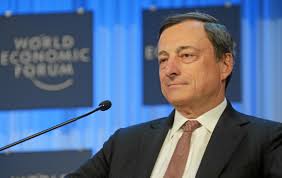UPDATE 1-ECB's Draghi denied grand finale as economy weakens and dissent grows

Mario Draghi may be the man who saved the euro but his last news conference as President of the European Central Bank on Thursday is unlikely to be the grand finale he was hoping for.
Inflation in the eurozone languishes at less than half the ECB's target, the economic outlook is darkening again and support for Draghi's brand of aggressive money-printing has never been lower among rate-setters. All that is taking the shine off an eight-year reign whose dramatic climax was Draghi's 2012 pledge to do "whatever it takes" to save the euro -- code for coming to the rescue of heavily indebted member countries and credited with averting the shared currency's collapse.
But more recent moves have been less well supported and Draghi is set to spend at least part of his final news conference defending last month's decision to restart the ECB's 2.6 trillion euro bond-buying program despite opposition from a third of fellow policymakers. "We expect Draghi to come up with a strong -- emotional -- plea in support of the September package, probably combined with a broader attempt to safeguard the legacy of all measures taken under his leadership," said ING economist Carsten Brzeski.
At Thursday's meeting, which will also by attended by incoming ECB president Christine Lagarde, Draghi is set to argue that a dismal flow of data has proved him right and may require the ECB to do even more. Price growth in the eurozone was a paltry 0.8% last month, a global trade war has probably pushed the bloc's largest economy, Germany, into a recession and the risk of a hard Brexit continues to loom large.
While policy is all but certain to stay unchanged after the bank unveiled a massive stimulus package just six weeks ago, Draghi will keep the door firmly open to even more stimulus if the outlook continues to sour. Markets were calm ahead of the meeting, with the euro little changed against the dollar at 1.1143 and German 10-year yields at -0.39%, well up from lows of below -0.7% before the September ECB meeting but little changed on the day.
For investors, gauging sentiment on the Governing Council will be key after a very public spat followed the last meeting and culminated in Germany's appointee to the ECB's board, Sabine Lautenschlaeger, stepping down. The turmoil is certain to extend into the mandate of Lagarde, who takes over on Nov. 1. She has promised a review of the bank's "monetary framework", likely to mean its policy goals and tools.
"Lagarde’s most pressing job will be to bridge the divisions," Berenberg analyst Florian Hense said. "The planned review ... could be of crucial importance for Lagarde to narrow the divisions." The ECB's policy decision is due at 1145 GMT and Draghi's press conference starts at 1230 GMT.
HAWKS CIRCLE Lagarde will have to deal with objections that Draghi's policy of sub-zero deposit rates and massive bond purchases are hurting savers, squeezing banks and pension funds and inflating financial bubbles while doing little for inflation.
And it's not just a few prominent hawks -- including the central bank governors of Germany, the Netherlands, and Austria -- who question the wisdom of resuming the bond-buying program. France's representatives on the Governing Council also joined the chorus and 95% of respondents in a Reuters poll said the stimulus package would not significantly help in bringing inflation back to the ECB's target of just under 2%.
"Dissent within the Governing Council against the latest package cannot be ignored, especially since it is no longer coming exclusively from the same core countries," Gilles Moec, chief economist of French insurer Axa Group, said. The problem for the ECB is that some of the major factors depressing prices are outside its control.
These range from demographic and technological changes to the euro zone's reliance on exports, in particular by German manufacturers, which leaves it bearing the brunt of the trade war. With the ECB's firepower now largely spent, Draghi and his successor are likely to continue urging governments that are running a surplus, such as Germany and the Netherlands, to invest more to generate economic growth at home.
But the latest budget figures, showing only a modest expansion, suggest their calls are likely to be frustrated for now. "We think ECB monetary policy will be on autopilot for a while," BNP Paribas said. "We think it will maintain its current hyper-accommodative stance well beyond 2020 and that the threshold for further easing is rather high."
(This story has not been edited by Devdiscourse staff and is auto-generated from a syndicated feed.)










